 When texting became all the more mainstream (especially with those under the age of 30) around 2005-2006 ish, I was a bit skeptical of the practice. What was the point? Why not just call someone?
When texting became all the more mainstream (especially with those under the age of 30) around 2005-2006 ish, I was a bit skeptical of the practice. What was the point? Why not just call someone?
Even with my reservations, I got in, especially as youth in the church where I was serving full-time were texting me no matter if I liked it or not. My cell phone bills soared. So, eventually, I broke down and bought a texting friendly phone plan too. I found that certain youth would only come to events if 1) they didn't have anything to better to do 2) I texted to remind them to come. If I wanted a youth group, texting was a key!
And, soon I found myself texting my husband when a meeting ran over or when I was going to meet him for dinner. I texted friends happy birthday. I kept up with my sister in college through texts. Texting was not just "for the youth" it was part of my personal life too. Of course, it didn't replace personal contact and even voice-to-voice phone calls, but it enhanced communication in an ongoing relationship.
Yet, when I became the pastor of Washington Plaza, I thought for a while that my texting days were over as far as work stuff was concerned. "No one here will be kept from coming to an event because I forgot to text them, " I thought. I was entering as the pastor of a congregation made mostly (at the time) of folks over 60. However, a few folks, though have surprised me. (It always makes me smile to get a text message from someone over 50. Always).
But as texting has become all the more mainstream in culture and we've added some young members to our roles, texting as pastoral care has become all the more important part of what I do. In a given week:
Members text me to tell me prayer requests or to give me updates on sick family members.
Members text me to ask for rides to church or to let me know if they will or will not be at a Bible Study.
Members text me to remind me to perform a particular task before Sunday morning worship begins if they are out sick.
I text members to check on them when I know they've been going through a particularly difficult time.
I text members to let them know about the urgent needs of those in our community such as a death or a hospital stay so that they can extend their arms of service in our community too.
I text members to tell them that I missed them in worship and can't wait to see them again soon.
You can call a text message impersonal form of contact, but ultimately, it is contact. Contact is all about love, concern and faithfulness to those in whom we are covenanted together in community with. I will keep doing whatever it takes to have members and visitors alike in this community know that I care about them and so does the church-- even if it means sending them a message I thought never would be considered pastoral: a text.
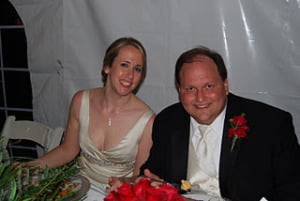 Today, I'm celebrating my fourth wedding anniversary alongside a man I think is a really amazing guy, but instead of turning this blog post into a purely personal narration of how much I love this man I admire more than any other in the world I wanted to consider marriage in a much larger context.
Today, I'm celebrating my fourth wedding anniversary alongside a man I think is a really amazing guy, but instead of turning this blog post into a purely personal narration of how much I love this man I admire more than any other in the world I wanted to consider marriage in a much larger context.
As part of my vocation, I probably get to talk about and participate in more marriages than the average person. People come to me for marriage counsel. I receive requests to officiate the weddings of others, most for whom regular church attendance is not a part of their week. I lead pre-martial counseling sessions for couples entering into the unknown of martial bliss.
And, in all of this, one thing is for certain, we all have screwed up ideas in one way or another of what marriage is. It takes time and long (actually very long) conversations and life experiences to work it all out. Whether it is because of the marriages (or lack thereof) that we've observed growing up, or unrealistic expectations of what a partnership can be imposed to us from our culture, or unmet desires within our own lives that we hope another can "complete" us if we just find the right person . . . marriage, if we choose to enter it is often doesn't turn out how we might have planned. It can be both better than we ever imagined or worse.
There is one thing I know for sure about marriage and that is both partners have to be in 100% at all times. Nothing more and nothing less. Because:
Marriage is not finding a relationship that will meet all of your needs. Larger networks of friends and family are always important to sustaining the ebbs and flows of any long-term partnership. For me, I dare say that my girlfriends and other family connections are what have helped my marriage keep going especially at its lowest points.
Marriage is not a relationship with someone who you can expect to stay the same year after year. As much as you hope grow wiser ever year and maturity through the good and not so good choices you make, so will your spouse. Change will come not matter if we like it or not, so marriage has always been and always will be about a lifelong relationship of learning.
Marriage is not about bliss every single day. Fighting over what movie to see, disagreeing about what kind of chicken to ha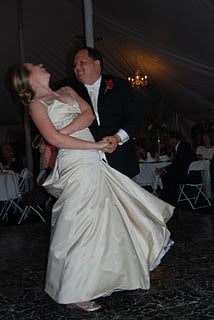 ve for dinner, and miscommunication about some of the deepest emotions your partner shares happens in even the best marriages. Just because you have a bad day it doesn't mean the marriage is bad. . .
ve for dinner, and miscommunication about some of the deepest emotions your partner shares happens in even the best marriages. Just because you have a bad day it doesn't mean the marriage is bad. . .
Marriage is not about committing to someone whom you know and love perfectly on your wedding day-- for the journey has just begun. As I look back on our wedding pictures, I think "I barely knew Kevin then" (though I thought I knew him amazingly well at the time) for what we've been through together over the past four years. I think in many ways we've both surprised each other-- both receiving what we didn't expect on the day we first said, "I do."
Marriage is not salvation from the home life that you are trying to escape. No person, no matter how amazing they are can transport you to a world where your past life experiences aren't important in shaping your becoming. In making a new family together, you have to honor the past.
Marriage is not just about having sex without guilt and/or having children. For those who get married out of the guilt of "we've already had sex so we must get married now" I fear this is not a good reason to start a lasting partnership. Marriages are about sharing your whole life with one another of which sex is only a part. And, children, when they are present in a home, are ultimately not enough to keep marriages strong. The adults have to work on this . . .
I wish someone had told me all of this about marriage when I first begun this adventure. But, I'm sure, as I know four years is only a short period of time, that my learning about what marriage is and isn't has only just begun.
I recently started writing with Provokive Magazine, an online journal which seeks to address this:
In a world saturated with people shouting at each other, it’s rare to find a place where people can engage in conversation with each other. Provoketive Magazine hopes to change that. We’re creating a space of rich conversation about life, faith, justice and culture without judgment. Our desire is to provoke the reader’s imagination through conversation and open up spaces of dialogue, learning, and hope.
My first post for this site was formulated out of a conversation with a faithful blog reader and church member-- you know who you are 🙂 I hope that you will join me and others on the conversation at Provoketive. Here's a teaser to my piece called, "The Gym and the Church: I Can't Get to Either."
 . . . .I have to think this unique pastoral challenge of mine– getting butts in the pews as the old saying goes– is not so unique to my context. In our over simulated, over scheduled world especially among urban dwellers, attending to our soul through church involvement is often valued by the spiritual as important, but not important enough when sleeping in on Sunday morning seems all the better for life/ work balance. . . . Read more by clicking here.
. . . .I have to think this unique pastoral challenge of mine– getting butts in the pews as the old saying goes– is not so unique to my context. In our over simulated, over scheduled world especially among urban dwellers, attending to our soul through church involvement is often valued by the spiritual as important, but not important enough when sleeping in on Sunday morning seems all the better for life/ work balance. . . . Read more by clicking here.
How many more wake up calls do denominational leaders need before they realized that what they are doing is not working and dying a slow (and painful for the rest of us) death?
I was attending this afternoon the "Senior Pastors Only" breakout session at the DC Baptist Convention annual meeting which Washington Plaza is a member and I found myself insulted, discouraged and wanting to throw up my hands and saying, "What's the point?" once again.
Our church is a member of this ABC-USA regional body for several reasons-- we want to be connected to our larger family of Baptists, we want to be known as an American Baptist church, and we want to partner in missions. Personally, I am indebted to the DC Baptist Convention for its recognition of my ordination, vocational placement service when I was a new seminary graduate, and for the friendship with other local pastors that I have made through attending activities supported by the convention. As a church, we are personally grateful for the way in which the DC Baptist Foundation came alongside us and helped us with our loan to repair our building last year and for its celebration of diversity, especially racially in its composition of churches. I pray for a really bright future for DCBC as I think there are some good things going for us that could be even better.
But, if this current Annual meeting held this week at the Mt. Jezreel Baptist Church in Silver Spring, MD is any indication of the new direction its leadership is taking, I fear convention life in DC is a sinking ship for progressive churches like Washington Plaza. We need sessions where we stop playing around with pleasantries and simply say more often what is actually going on. There is division among us. We don't know each other. We aren't really doing anything new or exciting just going through the motions of the same old things. The church is speaking a langauge that no one "unchurched" understands or cares for anymore and denominations seem to pushing its pastors toward more of the same.
During the session I attended, the presenter addressed the room as if it was 1950 in Alabama. We were told about how to take care of our "wives and children" on repeated occasions. And the word "he" was always used as the pronoun to address who a pastor was. Even though there were at least 6 or more women in the room who were senior pastors of churches like myself, all of the examples the presenter gave related to men. For example, he goes to a men's breakfast every month with other men just like him. He started small groups for other men. It was as if the presenter assumed that the women in the room were pastors' wives. Gross. Really, really gross. And, this is not mention the fact there was no senstivity to those who are single.
I'm all for theological diversity. But, a celebration of diversity always begins with attention to context and respect for those who are different from you. Diversity always encourages out of the box thinking because no assumptions are made that individual thinking is better than that of a group.
For those who think the church and denominational life is out of touch, out of touch and dying, then I say today that I sadly agree with you. Thank goodness, I'm a Baptist after all and tomorrow I can get back to the work of my local congregation, an autonomous body of believers who isn't afraid to try new things.
Change is inevitable, growth is intentional –Colin Wilson
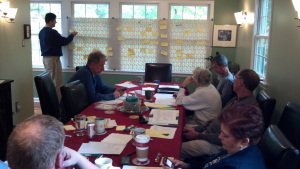 Such was one of the quotes we discussed together as a small group gathered at the Brunson's home on Tuesday night last week. Gathered together in the spirit of stewardship season as our theme is "An Intentional Life" we talked about the ways that we've each been both intentional in our life practices . . . and not.
Such was one of the quotes we discussed together as a small group gathered at the Brunson's home on Tuesday night last week. Gathered together in the spirit of stewardship season as our theme is "An Intentional Life" we talked about the ways that we've each been both intentional in our life practices . . . and not.
As we sat around the long dinning room table and shared with one another stories from our own journeys, I could help but think about a theme that has been present in several of my conversations both in and outside the church lately. "Does life get better than this?" people muse with me. "Or, must I simply resolve that this is all there is?"
Every time I've heard this question raised, a part of me has cringed on the inside because of what it says about hope. To be moving in life without hope-- to believe the pain we feel in the present and the countless ways our lives have not turned out like we'd planned is the essence of life-- seems to be giving up too soon.
I often hear people saying similar things about our church. We'll never be this or that . . . and it makes my heart hurt every time I hear it because it means folks are giving up dreaming thinking that what they see in front of them is ALL there is.
On Saturday morning, a group of us gathered ironically around the same table (thank you Brunsons again!). This time it was the church council planning retreat. We set our dreams first of what we'd like to see happen in the church in 2012 and then took a step back and said to each other we are going to be intentional to do this activity and lay aside the rest for later.
It was a freeing exercise I believe for all of us. Freeing because it allowed us to move in hope and not feel overwhelmed. While there are a lot of really GOOD things that all of us want to do (and usually it is the dreaming types that are in leadership positions in the first place), we simply can't do it all and keep going as a congregation. Putting our best foot forward often means taking a two steps back and those two steps really aren't so bad.
So, as our group drafted our 2012 intentions in areas of worship, fellowship and mission activities, we said to each other as church leaders that our little and mighty congregation is full of hope. And it is hope that we keep on keeping on and move forward.
Intentional Vision
Exodus 17:1-7
 When you were a child what were your dreams for your life? What did you want to be when you grew up? What did you imagine your life would look like?
When you were a child what were your dreams for your life? What did you want to be when you grew up? What did you imagine your life would look like?
Did you dream of being a doctor, a lawyer or a firefighter? Or a grand supreme winner on Star Search (as I did at age 6)? Did you hope you'd one day get married? Did you wish you'd one day have children that were as beautiful as Barbie and Ken and living happily ever after in Barbie's pink house? Did you draw pictures of the home you'd believed you'd raise your own children in one day with a red door and shutters that open and closed with ease?
But the reality is that as much as each of us had dreams and hopes for what the days of our life would hold, in actuality all of our lives in some way or the other has not worked out as we planned.
It's true as it is said, that no child grows up and says to their parent or caregiver, "I want to be an addict when I grow up." "I want to
get a divorced after a long custody battle with the woman I thought I'd love forever when I grow up." Or, "I want the house I bought with my life savings to go into foreclosure when I grow up."
The reality is: sometimes we don't even make it to the Star Search stage outside the makeshift one in our own living room. Sometimes, we find ourselves in mid-life living out of our car and not the house with that red door. Sometimes, our children grow up not to look or act like Ken and Barbie and drive us completely nuts.
Some of these situations, of course, stems from moments when we've lacked willingness to make good choices, but a lot of it comes from life just being life, in this broken world of ours that seems to become more broken all of the time. And, as a result, there are moments-- and you may have had one of them week-- when you want to throw your hands up in the air and say, "This is not the life I planned for myself." Or, "This is not the life I really want to be living. Ahhh!"
For as much as we've had good intentions and good desires for our lives-- to own a home that can be a blessing to our family and others, to be in long-term partnership with someone in whom we can love unconditionally and who loves us back, to be a parent who sees our children having children, life doesn't give us what we always want. It is often even our purest and deepest desires that just don't seem to pan out. No matter how hard we worry, pray and hope for the best and as much as we watch others being blessed, it seems that our hands come up empty time and time again.
If this is the situation that you find yourself in this morning-- wishing for things in your life that you don't have, then you are in great company as we examine our Old Testament reading for this morning among the Israelites. For they too, had a good desire, a need in their lives that they longed to be fulfilled yet simply was not. They were thirsty. I mean, really, really thirsty without a drop of water left.
I don't know the last time you were thirsty. I can't remember when this was for me. It's rare in our water bottle and water fountain on every corner culture that we "die of thirst" literally or metaphorically in this neck of the woods very often if at all. Water is something we have enough of, almost always, unless of course a tropical storm threatens to come through and our neighbors hoard the bottles of water off the shelves at Safeway and Giant leaving nothing for the rest of us . . .
But, in the wilderness where the whole congregation of Israelites found themselves on this journey from Egypt to the undefined and yet undiscovered Promise Land was, the resource of water was everything.
To find water was to find life and either you had it or you didn't: their search for water would be uniquely tied to who they were as a people. For example, just three days after crossing the Red Sea-- the big and dramatic-- experience of faith, the group was short on the provisions of water and the Lord had provided and God directed them to some springs. But again, they were without saying to Moses in verse 2, "Give us water to drink."
And, such was a good, normal, everyday, essential need, right?
H2O, we know, is critical to our very existence: the definition of a need. Most medical professionals will say that a human being, in reasonable to good health can only live between 3-5 days without water before suffering from extreme dehydration and shock leading to death.
So, while, we read Exodus 17 with thoughts in our head like "here they go again complaining," simply the Israelites sought to express a deep need when they told Moses, their spiritual and administrative leader, "We must have water now!" This "following God" and "making a new life" for themselves plan was not working out.
In the meantime, however, what were they to do? How were they to wait? How were they to respond to an unmet need that they were powerless to fix? Did it mean that their need was not really a need? Did it mean that God had abandoned them and truly wanted them to die as they feared? It sure felt that way . . .
It's easy to kick the dog when you are down right? And, so, went the days of the lives of the Israelites and their relationship to Moses. As they perceived God not giving them the life they wanted, they took out their pain on the easiest next best thing: Moses. Voicing their frustration to the point that we hear Moses fearing for his life in verse 4-- believing that in their extreme thirst the crowd might stone him if they didn't get a drink and fast.
Moses' natural response to the crisis as a leader was fearful of the crowd's response, but tempered. We hear in the words of this text, Moses wanting the crowds to simmer down, stop bothering him and simply trust that God could provide-- as this was God's job to meet their needs.
I can imagine, if I were a member of the crowd, I would have found Moses' calm as a cucumber leadership style really annoying.
Trust that God would provide? "Oh, Moses," I would have said, "It's so much harder than that. When, tell me, when God is going to get God's act together and find us some water."
For, secretly they hoped that in Moses' bag of superpower, bring on the 10 plagues kind of tricks, he could lead them by another spring and they'd worry about water no more. But, such was just not going to happen.
A friend of mine shared with me this week a similar frustration with the world and with God. After being out of work for the past nine months due to a company downsizing in these difficult economic times, she is currently at the end of her rope. After sending out over 500 resumes, doing everything she can to do what experts say to do when you are looking for work: networking, staying on a schedule everyday and trying not to get down on herself even as the funds in the bank account slowly begin to run down, she feels the best parts of her life are dying more every day.
After interview after interview, rejection letter after rejection letter, and sleepless nights and pleas to any religiously minded person she knows for prayer, my friend shared she was beginning to think that God had forgotten her. No one in her life seemed to care that she was out of work and without a job coming her way soon, she might lose everything she's worked so hard for including her modest home. Life was not certainly turning out as she wanted.
But in the spirit of these same frustrations, the Israelites were asked, beginning with Moses, to be active in their faith of God and to begin to see beyond their circumstances in a way they'd never seen before.
These were Moses' instructions from God: "Go on ahead of the people, and take some of the elders of Israel with you; take in your hand the staff with which you struck the Nile and go. . . . Strike the rock" God said, "and water will come out of it."
the staff with which you struck the Nile and go. . . . Strike the rock" God said, "and water will come out of it."
I can imagine that laughter erupted from the crowd and anxiety of what might be next (if this didn't work) consumed Moses' thoughts. This God they were serving was just getting crazier and crazier all the time . . .
Professor Amy Erickson puts it like this, "It strikes me (pun intended!) that God choose to bring water-- and the life it symbolizes and will impart-- out of something that appears to be lifeless. . . . Out of Egypt and out of the wilderness, God will find ways to make life flow in the unexpected ways."
Even with all the pre-rock striking anxiety, when it does work, the provision of water is NOTHING like they expected.
The water came not from a spring (as it did before) nor from going back to Egypt (as they had suggested). The provision was resurrection before their eyes! That out of something that seemed life-less and certainly not life-giving, out flowed streaming of living water: a big ole rock!
Which begs us as a congregation, as seekers of this same God to wonder: where is our water? Where is our rock to turn to? Where is our spring? Where can all the hurting hearts among these pews this morning find hope once again? Where is the spring where we can know life can be and will be better than this?
Using our text for a guide this morning, our answers come in thinking for a minute about the quandary of the "My life didn't or isn't turning out the way I wanted" situation altogether. Let me ask you the same question of you in a different way.
Does scripture tell us that in life, we should expect to receive the dream we dreamed for ourselves when we were a child? Does scripture tell us in life that we should expect, as we follow God, that our lives will look exactly like everyone else around us?
I hate to burst your bubble this morning, but the answer to both of these questions is no.
Never does God promise us that in this life we'd get everything we want or that we can be confident that our lives will fall in the patterns just like our those around us.
But, if our unmet desires, are desires of lasting value, that are in line with the people who God has created us in all of our uniqueness to be-- then, we'd better watch out. God is going to be showing up in our lives in unexpected places, just as God did for Israel.
Showing up in places in our lives that we thought were long dead-- dead friendships, dead partnerships, dead vocational aspirations, or dead paths we'd traveled down our lives before-- and pouring from them water once again.
Not only so that we can receive what we've longed for, but so that the community around us can be reconciled and blessed by God too. Notice in this provision of water, not only is water given, but reconciliation. Moses, once distraught that the congregation would stone him, recognizes the Lord was among them and they all experienced God's provision together.
And, indeed our lives still might not turn out as would have liked them too (such may never change), but if we are open to God's direction, God's rocks of blessing, then I dare say our lives might turn out better than we'd ever dreamed from our days of playing with Barbies and Gi-Joes.
If you've noticed this morning the title of the sermon, "The Intention of Vision" you might be thinking, that all of this is nice but has nothing to do with casting or setting a vision. Yet, such could be farther from the truth, even if I haven't made such a point explicit for you this morning.
For when we are intentional about seeing our life as God see it-- not as worthless, not as used up and wasted and most certain not dead-- then, we begin to have vision for what is up head.
Vision, if you and I want to see the world from God's perspective . . . for ourselves, for our families, and for our church, begins with laying down the ideas we have about "What we wanted to be when we grew up" so that we as children of God, can help us see "what our Heavenly Parent wants us to be when we grow up." Which is what the month of stewardship every October is indeed all about-- re-centering our lives on God's vision for us, instead of just our own.
 This morning, when you came into worship this morning, you were given a stone. It's yours to keep or throw away (as long as you aren't going to throw them at your pastor anyone else). But, if you feel so led, I'd invite you to have this stone be for you this week and in the weeks ahead a tangible symbol of your intention to align your life with God's vision for you and for us collectively as a church. I invite you to simply hold it in your hand as we sing our hymn of commitment in a few minutes.
This morning, when you came into worship this morning, you were given a stone. It's yours to keep or throw away (as long as you aren't going to throw them at your pastor anyone else). But, if you feel so led, I'd invite you to have this stone be for you this week and in the weeks ahead a tangible symbol of your intention to align your life with God's vision for you and for us collectively as a church. I invite you to simply hold it in your hand as we sing our hymn of commitment in a few minutes.
May it be a reminder of the one who can bring forth water from the largest or oldest or most regrettable stones that surround your life-- remembering every time you touch its smooth texture that indeed the Lord is with us. And, will never leave us to face our perils of the journey alone.
AMEN
 Today, I got an email from Ross Murray who is the director of Religion, Faith and Values for GLAAD (Gay & Lesbian Alliance Against Defamation)-- an organization that I personally support. In this email he encouraged the following:
Today, I got an email from Ross Murray who is the director of Religion, Faith and Values for GLAAD (Gay & Lesbian Alliance Against Defamation)-- an organization that I personally support. In this email he encouraged the following:
"I’m writing to ask/remind you one more time to go purple and ask your constituents to go purple this Thursday, October 20 for Spirit Day. Millions of Americans wear purple on Spirit Day as a sign of support for lesbian, gay, bisexual and transgender (LGBT) youth and to speak out against bullying. Spirit Day was started in 2010 by teenager Brittany McMillan as a response to the young people who had taken their own lives. Observed annually on October 20, individuals, schools, organizations, corporations, media professionals and celebrities wear purple, which symbolizes spirit on the rainbow flag. Getting involved is easy -- participants are asked to simply "go purple" on October 20 as we work to create a world in which LGBT teens are celebrated and accepted for who they are.
Religious communities are an important part of the support network for many LGBT youth. Spirit day is a great opportunity to get involved and make your support known!
So consider wearing PURPLE tomorrow in support of all of those who need to be reminded that they are seen, heard and matter to the human race. And take some time as you do to consider who you know that might need some encouragement that they matter to YOU.
The pastoral life like any other profession, I believe is an art form. To practice it is to create: to explore the unknown deep waters of life through practice, mistakes, more practice and more mistakes and hopefully come out with something beautiful on the other side.
One of the best things I do to stay grounded in the art of pastoring is befriend and stay in close friendship with a couple of pastors who I know are on a similar journey of growth as pastoral artists. Though something as simple as going to lunch regularly with other Revs or finding moments in our hectic schedules to remain an important part of each other lives, I make my membership in an artistic community.
To foster this type of togetherness, sometimes we just talk about what is going on in our lives (you know even pastors need a pastor), sometimes we attend church or denominational functions together, sometimes we get our nails done together (the female pastor friends types). In these get-together ideas are shared among us. "Hey, what are you preaching on for Advent?" Or, "Have you ever taught a book study on this topic?" And, new practices for ministry are brought up, "What if our congregations did this together?" or "Have you ever considered partnering with this para-church group?" And then there is the all important question: "What books are you reading right now?"
But, there are some books I can't read with other pastors. In fact, I refuse to read them as much as I want to be respectful of the interests of my colleagues.
I won't read books that are poorly written or come from a tradition that do not affirm my existence as a female pastor. There's so much I have to learn from those I first respect, so good to start there, right? And, I won't read books that have prescriptive ideas of a one-size fits all approach to ministry.
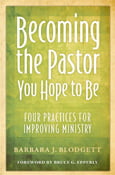 Recently in a clergy meeting, we decided to read the book: Becoming the Pastor You Hope to Be recently published by the respected Alban Institute. Even though I suspected this volume would be one of those that I didn't like very much, I picked it up and tried to read as much as I could. And after 50 or so pages I really wanted to throw it across the room. It all seemed like well-meaning, but scripted advice. For to be told the four things you need to do to be a good pastor is like giving a kid you think has the talent to be a good artist a paint-by-number kit and saying: "There's your training."
Recently in a clergy meeting, we decided to read the book: Becoming the Pastor You Hope to Be recently published by the respected Alban Institute. Even though I suspected this volume would be one of those that I didn't like very much, I picked it up and tried to read as much as I could. And after 50 or so pages I really wanted to throw it across the room. It all seemed like well-meaning, but scripted advice. For to be told the four things you need to do to be a good pastor is like giving a kid you think has the talent to be a good artist a paint-by-number kit and saying: "There's your training."
Churches like paintings, are made up of unique people, settings and histories, so to give advice in this way to its leaders-- though some of it may be good common sense-- is to assume that all of this uniqueness doesn't matter. It assumes that doing ministry in an urban setting in Washington DC in a Baptist church is the same as doing as ministry in a rural setting in Wyoming in a Catholic parish, which of course just doesn't work.
If we truly see ourselves as pastor artists, then, I think some expanding our horizons is in order. There is not really a church growth plan in a box that is going to teach us everything we need to know to run "good" or "successful" churches. Artists after all become more creative and interesting the more they create outside the normal boundaries and experiment.
 Recently, I read a quick page turning novel, which did more for my creative life than any "how to" volume could. Cutting for Stone follows the lives of two boys from birth to adulthood, growing up with adoptive doctor parents in Africa and is full of unexpected twists, turns and vivid scenes that made me feel like the characters were actually friends of mine. Deep in the story are truths about the human condition of pain, loss, jealousy, and redemption. It was a mine of diamonds for the pastoral life that I'm still mulling over even though I finished it weeks ago.
Recently, I read a quick page turning novel, which did more for my creative life than any "how to" volume could. Cutting for Stone follows the lives of two boys from birth to adulthood, growing up with adoptive doctor parents in Africa and is full of unexpected twists, turns and vivid scenes that made me feel like the characters were actually friends of mine. Deep in the story are truths about the human condition of pain, loss, jealousy, and redemption. It was a mine of diamonds for the pastoral life that I'm still mulling over even though I finished it weeks ago.
With encouragement from my clergy friends, a bookshelf full of novels and other "non churchy" books, I'm going to keep reading and experimenting with this life I've been called to lead. Though today feels like one of those "blank canvas" type of days, I hope that by the time my work is through for the day I'll have some creative ideas to what might be coming next . . .
About three years ago now, when I was interviewing with the Pastor Search Committee of Washington Plaza, I was asked: "What is one  of the biggest mistakes you've made in your life?" (which is an interesting question by the way).
of the biggest mistakes you've made in your life?" (which is an interesting question by the way).
I'm sure I paused for a minute or two to answer (because who really wants to speak about failures at a job interview), but still remember what I said. And it was, "Times in my life when I have not been truthful to myself. When I have responded to situations in ways that were what others expected of me, or made decisions based on what was more of an acceptable choice, or held back part of myself in hopes that it might make others like me more. "
And, if someone were to ask me this same question today, I believe I'd respond in a similar way-- for when I think great errors in judgment have been made on my part, it usually goes back to a fear or inability to be ok with authenticity at a deep level. I've allowed myself to be beat down by things that people have said to me that are out of line with what I know God thinks of me. Or, I've allowed the puffed praise of others to led me to think more of myself and act in a way that shows I think I'm better than . . .
This week, I was having a conversation with a friend who I've been in relationship with for over 15 years. We've appeared in and out of each other's life stories though we've rarely resided in the same city. We were talking about what makes up the "good stuff" of conversations (at least from my perspective) . . . what makes us tick as people, what makes us deeply sad, and what we fears surround our lives that we rarely say aloud. And a consistent theme emerged: our deepest regret in our lives, even as my friend and I are generations a part in age, all goes back to authenticity.
We've both held parts of ourselves back in our friendships, our vocations and our marriages at different points when the fear that we just weren't good enough, or didn't have the right things to say (or in our case sometimes had too much to say), or even that if people found out what we really thought we wouldn't be accepted as readily.
And, the more I reflected on this conversation since, the more it has enlivened me and saddened me at the same time. Enlivened my spirit because through the sweet words of this kindred spirit friend, I've got some pep in my step again to keep moving in the direction of what I feel God has given me passion to do: to deeply encourage the hearts of discouraged that life in God's hands can be better than we ever imagined it to be. But, I was also saddened because I know both how few resources of encouragement there are to live life this way (as everything in our culture seeks to tell us we are not right and must be "fixed" by changing our mold from how our Creator designed us to be), and how constantly fear seeks to hold all of us back from living out of this most authentic place.
It's really, really hard, I know to live life from your core of believing so strongly in something about your vocation, your relationships or just your life in general or even if this truth you know will cause hurt feelings to others you care about, led to criticism or failure, and more sleepless nights of despair than you can count. But, I know for certain that as I see it in scripture, salvation is all about being made whole. So, if we say we are a people who are in the process of "being saved" then, we've got to get to the business of living life truthfully.
And by truth, I mean this: more than avoiding white lies to our bosses, more than admitting to our kids that we aren't supermen and women all of the time, and more than just trying to follow the 10 commandments, but taking the leap of abiding more honestly in this world as ourselves. Living with passion of who we were made to be and not thinking any greater or less of ourselves than God created us when the Lord said we were "made in the image of God."
Let's all stop making the mistake of forgetting and not acting on this great truth. In authentic living, I know there are sweet life moments just around the corner for all of us no matter in what circumstances we find ourselves in now.
God can be found in the strangest places. God can be found when we least expect, even in places where we don't feel welcomed.
 Last week, I had the opportunity with a friend to attend an event an evangelical Bible church, a place I would normally not go for a concert my friend really wanted to attend. I don't like settings like this because I feel that if I were to open my mouth and tell the person beside me what I do, who knows what might be said or done to me! While there have been great strides in the acceptance of women clergy in certain settings, there probably still more Christians in the world who believe the manner in which I am carrying out my vocational calling is misguided and wrong. I simply hate to pretend. I don't like to feel like I'm not allowed to speak, and so evangelical Bible land is not on any list of a place I'd like to go back to anytime soon.
Last week, I had the opportunity with a friend to attend an event an evangelical Bible church, a place I would normally not go for a concert my friend really wanted to attend. I don't like settings like this because I feel that if I were to open my mouth and tell the person beside me what I do, who knows what might be said or done to me! While there have been great strides in the acceptance of women clergy in certain settings, there probably still more Christians in the world who believe the manner in which I am carrying out my vocational calling is misguided and wrong. I simply hate to pretend. I don't like to feel like I'm not allowed to speak, and so evangelical Bible land is not on any list of a place I'd like to go back to anytime soon.
However, as I was sitting in the concert, observing a blast from my past (I used to be great fan of the music that was being played), I began writing this blog in my head. For as much as I heard impassioned songs and speeches about who these individuals knew God and God's church to be, it is not the ONLY way. I felt empowered to claim differing ideas of what the church is and should be and why voices of progressive Christians like myself need to be heard as much as any evangelical ones do.
Though my church is not mega sized with bathrooms that look designed for stadium crowds with pamphlets on every corner about a particular ministry with rules for how everything in the church should be ordered, I believe we are faithful in what we do. And this is what church means to me:
1. A place where all are welcomed-- where no creed, code or dress gets you in the door faster than any others. To be a woman, a minority, a gay, lesbian, bi-sexual or transgendered person doesn't mean that you come into church as a second class citizen. All are one in Christ Jesus who is Lord-- and no sin is greater than any other (and being gay is not a sin).
2. God is bigger, as the saying goes, than any one religion. While Jesus is our path, we have much to learn from the faith expressions of other seekers. Being respectful of the beliefs of others is a non-negotiable.
3. Life can never be summed up in proof texting scriptures like "Rejoice in the Lord always" "In all things God works together for the good" or "Pray without ceasing" (i.e. if you just pray enough then God will give you what you ask for). Life as I know in this church of mine is too messy for simple band-aid answers. There is only so much one can take. And, to make blanket statements like "God is testing you" or "You must clear out all of the sin in your life before God will bless you" are just gross. The world is simply a broken place and sometimes our lives merely reflect the brokeness. Yet, this doesn't necessarily mean that we have sinned in any way or less loved by God.
4. God is a mystery. To know God is not to memorize a series of scriptures on which to have an answer to everything in your life. To be a seeker of your Creator in this world means that there is much unknowing that is part of the journey. While having access to truths of scripture and being connected to the faith traditions of the past can be helpful guides, God's ongoing revelation with and to us, means that often we have to throw up our hands and say we don't understand. Part of belief in God is the process of being unbelieving.
5. People of faith are called on by God to be instruments of peace and justice in this world. Not because we are called to evangelize with force. Not because it makes us better people (though it might). But because we are a part of a human family and thus have a responsiblity to all to share what we have so that the blessings of life may be known to all. Christ's life has taught us what selfish sharing is all about. Such should be our model-- being willing to lay down our life for others.
6. Worship is not to make us feel better or evoke some emotional response every time. Worship is to be reminded of who God is and why even in life's deepest pains, we have reason to hope. There is no one way to worship, and should not be dependant on any one form or process. Part of what it means to grow in knowledge of God is to be ok with different communities of worship's practice-- and not expect your way to be the way every time.
What is the church to you on your Wednesday edition? How might attending an event of a different faith tradition-- whether it be another denomination or different faith practice altogether-- actually strengthen your own convictions of faith?
 I heard the sad news this afternoon that on September 30, my friend Joe Smith had passed a way. After struggling for several months with lung cancer, loosing his voice and later his strength, he ended his fight last week. He left this earth too soon!
I heard the sad news this afternoon that on September 30, my friend Joe Smith had passed a way. After struggling for several months with lung cancer, loosing his voice and later his strength, he ended his fight last week. He left this earth too soon!
When Joe and I first met, I was one of the pastoral associates at First Baptist Church of Gaithersburg, Maryland. He entered the picture as Interim Pastor hired by the church leadership to come and "supervise" the "young pastoral staff" because we weren't seen as capable of leading the church in the transition. If you know me well at all, you know that such an intention of the church leadership was not agreeable to me-- I felt hurt and overlooked for the gifts I could bring to the church at this crucial time. So, especially in our first couple of interactions there was tension. Joe wondered why I wanted to preach so much as the previous Senior Pastor had allowed and seemed unsure of what to do with me . . and I wasn't sure what would happen. At best, I hoped that we could work together in ways that were helpful to the church. (Pictured to the right was the staff)
But as is the case in most relationships, when you move from knowing "of" someone to actually knowing them, things quickly change. As time went on and Joe heard me preach and I watched him lead, we soon gained respect for one another at a deep level, even with our theological differences. I knew he wanted me to succeed. He knew I would soon be a senior pastor, the question would just be where? I knew the church was blessed by his ministry. On countless occasions we would have long chats about how to best respond to moments of crisis within the congregation. Joe would carefully listen to my perspective and always made me feel like a valuable part of the team. I learned so much from him about how to lead when you aren't in charge, the importance of sermon series in shaping the life of the church and how to really love being a pastor.
When we had lunch one afternoon in Bethesda, three years ago now, I told Joe the news I dreaded to share. I would soon be leaving FBCG to become the pastor of Washington Plaza. He quickly put me at ease and cheered me on for this new adventure.
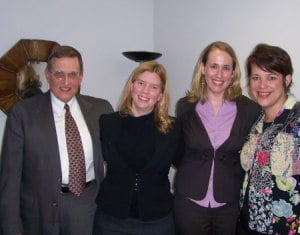 On my first Sunday at Washington Plaza in January of 2009, I found flowers on the altar that I knew he'd arranged to be present there in support of the day. And, when Washington Plaza installed me as their 4th pastor, Joe came again-- this time to give the "charge" to me to look to the future in ministry. He's pictured to the left alongside the two other speakers for the special occasion.
On my first Sunday at Washington Plaza in January of 2009, I found flowers on the altar that I knew he'd arranged to be present there in support of the day. And, when Washington Plaza installed me as their 4th pastor, Joe came again-- this time to give the "charge" to me to look to the future in ministry. He's pictured to the left alongside the two other speakers for the special occasion.
Over the past several years, we've kept in touch though we no longer worked together. I was given several wonderful volumes from his library that he was cleaning out and wanted to give to some "young pastors." (This time I didn't mind being called "young"). I found out that Joe was reading my blog and was eager to comment if something I wrote connected with him in any way. Joe was also quick to send me an email about news of shared friends. For he never wanted me to be out of the loop.
Joe was kind and thoughtful in ways that were attentive to detail but were never showy or over the top. He left a legacy of faithfulness in so many communities of well-edited documents, quick humor and preaching on his toes.
I will miss Joe and know some angels in heaven must be rejoicing about now as he is at peace. I am sorry, Joe, that I never got to say good-bye! I am forever grateful for your contributions to my life. With my deepest regards-- your last associate pastor trainee.
When is the last time you were really searching for something? Can you remember the last knock out, drag out all of the couch cushions, search every cranny of all of the drawers, crawl under the bed, call lost and retrace your steps until you are exhausted—all in pursuit of something meaningful to you that you simply cannot find anymore?
 Yesterday, I was on one of these crazy all-consuming searches that gave the meaning of "coming home" for homecoming an all new meaning. After a week off for vacation, I needed to get home for church this morning.
Yesterday, I was on one of these crazy all-consuming searches that gave the meaning of "coming home" for homecoming an all new meaning. After a week off for vacation, I needed to get home for church this morning.
For those of you who travel a lot, you know that the goal is to always be prepared for anything and to have your plans flexible at all times for you never know what might happen to you. And, as Kevin and I boarded the shuttle that took us from our hotel to the airport at 5:30 am, we were believed we’d be home from our week of vacation in Curacao (an island next door to Aruba) by late lunchtime and all would go as planned.
However, soon after we got through the long line at the ticket counter, through security and immigration and were patiently waiting for our plane to board at the gate, we got those dreaded five words that any traveler hates to hear: “Your flight has been canceled.”
We were crushed with frustration especially as we learned the only reason our jet would not board was because a flight attendant was not feeling well and they couldn’t fly without her. We were told to go get our bags, leave the terminal and go stand back in line to re-book our tickets for flights that were seemingly non-existent. (American Airlines is not my friend).
I had homecoming on my mind and how important this day in the life of our church was, I couldn’t be stuck on the island, I kept saying to Kevin. . . So, I dashed back to the ticket counter to stand in the long line already forming, hoping God might smile on my travel karma just a little. Even as tech savvy travelers around me crumbled while looking at their blackberries and I said, “I bet we won’t get out of here for a couple of days, the next couple flights back to Miami are booked” I was determined to search—to find a way to get off the island and at church in the morning.
The series of events in this search were nerve-racking from the beginning. From Kevin calling the airline only to get the news that we were re-booked to arrive home on Sunday night (not cool), to moving our hopes to the local airline which boasted of a flight to the US in a couple of hours, to standing in their new long and disorderly lines, to being told by one ticket agent when I finally got to the front of the line that there was one seat on a flight out-of-town for the morning, but . . . with the catch that I couldn’t buy it there.
I was told that: I’d have to find the airline rental car shed ½ mile away, only to arrive out of breath (I was running in jeans) with the message of: the seat on the flight I was promised was taken.
BUT I could be on stand-by if I walked back a mile and a half back to the ticket counter for another 30 minutes, to then learn finally that there was a seat available (yes, finally some good news in the search!), but then to be told, I would have to go back to the rental car shed (1/2 mile a way but felt more like 2).
There I finally did buy the ticket to the USA to then be told to go back and stand in the ticket line (again) so that the boarding pass could be printed. Only to learn when I got back to the ticket counter that the flight was getting ready to take off and wanted to leave me. Luckily, with some persuasion by Kevin, “Sir, my wife is a pastor she has to get home today (though in this Roman Catholic country I know he was confused as to how I could be a pastor)” the search to get off the island ended as I ran like a crazy woman through customs again. Thank you Jesus that I was on a flight that I hoped would bring me home (though Kevin wasn’t as lucky will probably arrive home later on tonight with his own version of his “In search of” story).
I still think it is a miracle I got off the island. . .
Looking forward to a less eventful week than has this one began.